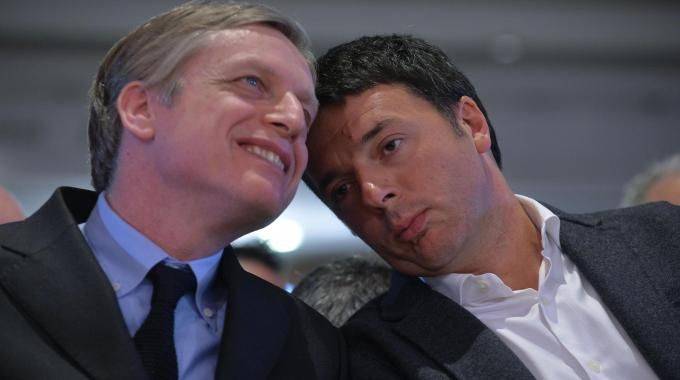Renzi and the PD Take Center-Stage
ROMA - The now splintered conservative parties represented by Silvio Berlusconi and his former alter ego Angelino Alfano slip at least momentarily into the background this week as the Partito Democratico (PD) finally takes center-stage. Opening December 8, the PD national convention will sanction the election of a new general secretary expected to represent a crucial generational shift away from the old-style politicians of the past. Three candidates are in the running in primaries throughout the country.
Matteo Renzi, 38, is the acknowledged front-runner. Official PD counts put him ahead of all other candidates, with some 47% of the votes in party primaries. The mayor of Florence, Renzi likes to appear in low-slung blue jeans and an open shirt. He has neither national nor international political experience, but is engaging and serious, eloquent and smart and, above all, young and new. Just now he likes to point out that, with Berlusconi out of the way, Premier Enrico Letta is the numerically strong man in the government, with 300 votes in Parliament by comparison with Angelino Alfano's 30. As pundits here put it, Letta no longer has Berlusconi as an alibi for failing to address crucial reforms.
Renzi urges Letta to act decisively, for, with Berlusconi out of the government, the PD is now more central to the government and to Letta's cabinet than before. The government , however, now come under attack on two fronts--by Beppe Grillo on the one hand and Berlusconi, "who knows very well how to run an election campaign," on the other. "If the government acts with uncertainty, our march toward new national general elections will turn into a funeral cortege," Renzi predicts. The so-called coalition of the "large understanding'" (as the former coalition with Berlusconi was called) is a thing of the past; and, if Alfano does not like the situation, he is still out-numbered ten to one, says Renzi.
Renzi wants the Letta government to focus upon three objectives: (1) revision of the present, detested election law known as the "Porcellum" to be replaced by a law that will "guarantee bipolarism and governability"; (2) a "job act" that will relaunch employment, including through simplification of the laws governing the work place (read: attack on the unions), and will attract investment; and (3) consider "the soul of the country"--that is, make schools, immigration and civil liberties a priority, including passage of a law permitting civil unions and another outlawing homophobia.
Renzi's principal rival is Gianni Cuperlo, born in Trieste in 1961. By mid-November Cuperlo commanded around 38% of those voting in the PD primaries. After graduating in media studies at DAMS at Bologna University in 1985, Cuperlo cut his teeth in politics, and has never looked back. He was the very last secretary of the Italian Communist party's youth organization (FGCI) and co-authored two books with PD old-timer Massimo D'Alema. Within the PD Cuperlo is reportedly popular with some on its left wing. Over 19,000 Italians follow his tweets at @giannicuperlo, in which he says things like, "We must understand that perhaps we are in the right but not necessarily the best; outside of ourselves there's lots that's good, we must consider it." From another tweet: "Politics must be self-critical, including on the left. We have lost touch with the people too often" (my translations). Ironically, while himself risking charges of being a continuation of the old PCI-PD, he accuses front-runner Renzi of being nothing more than a continuation of the past two decades of politicking, in effect defining Renzi as "Berlusconian."
The outsider running with the backing of the real PD left as well as those many intellectuals longing for genuine and even radical change is Giuseppe "Pippo" Civati, born in Monza in 1975. With a PhD in philosophy from the Milan State University and post-graduate studies in Renaissance humanism, he is a respected historian with a multitude of serious books and papers to his credit. Some are historical-philosophical, others are on Italian politics, such as "Digital Party, the PD of the Future." Cuperlo entered politics during Romano Prodi's 1995 winning campaign against Berlusconi. However, this mid-November Civati commanded at most 10% of pre-congress primary votes, according to the head of the PD organization. This leaves the real confrontation between Renzi and Cuperlo.
In the largest sense this PD convention assumes particular importance because it is a giant step toward recreating a progressive party that will shed its last vestiges of the old-line Communist party. Officially it died with the collapse of the Berlin Wall, but its rhetoric did not die with it, and in recent years the party has stumbled as a result. It's worth recalling that for the four postwar decades after the birth of Italian democracy in 1948 the country had two huge ideologically-based political organizations representing two-thirds of the electorate. Faced off against each other were the Christian Democrats, with the open backing of the Church, and the Italian Communist party (PCI), with the open backing of the Soviets--even though under Enrico Berlinguer managed the PCI managed to walk a semi-independent line from Moscow, to the point that at one party congress in Moscow its spokesman was not allowed to speak in the main party hall but only in an outlying gymnasium. Shaking off the vestiges of these four decades has not been easy for either right or left, but it is happening, if belatedly.
# # #


































i-Italy
Facebook
Google+
This work may not be reproduced, in whole or in part, without prior written permission.
Questo lavoro non può essere riprodotto, in tutto o in parte, senza permesso scritto.